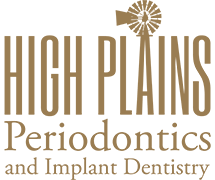Bruxism is a common condition characterized by the clenching, grinding, or gnashing of teeth. Many individuals experiencing teeth grinding in Lubbock, TX remain unaware of this condition until significant dental damage occurs.
Call 806-507-6906 to make an appointment for treatment at High Plains Periodontics and Implant Dentistry. Until then, review this educational guide for information on identifying, preventing, and treating teeth grinding.
Understanding Teeth Grinding
Teeth grinding occurs when an individual involuntarily clenches their jaw muscles and grinds their teeth together. While this can happen during waking hours, nocturnal bruxism — grinding during sleep — is particularly common. Research indicates several potential causes:
- Psychological factors: Stress, anxiety, and tension
- Physical factors: Malocclusion (abnormal bite), missing teeth
- Medical conditions: Sleep disorders including sleep apnea
- Pharmacological influences: Side effects of certain medications
- Lifestyle elements: Consumption of stimulants like caffeine
Identifying Bruxism
Clinical identification of bruxism often relies on observable symptoms. Patients should monitor for these indicators:
- Dental evidence: Enamel wear patterns, fractured teeth, or chipping
- Dentin exposure: Wearing away of enamel revealing deeper tooth layers
- Dentinal hypersensitivity: Increased sensitivity to temperature changes
- Muscular symptoms: Hypertrophy of masticatory muscles, fatigue, or soreness
- Referred pain: Temporomandibular joint discomfort, facial pain
- Sleep disturbances: Disrupted sleep patterns, daytime fatigue
Preventative Measures
Prevention focuses on protecting dental structures and reducing grinding behaviors. The primary intervention for nocturnal bruxism involves occlusal splints or night guards — custom-fabricated appliances that create a protective barrier between dental arches. These devices distribute forces evenly and prevent direct tooth-to-tooth contact.
Proper sleep positioning can reduce bruxism frequency. The supine position (lying on one’s back) minimizes jaw tension compared to prone or lateral positions. Additionally, application of moist heat to the masticatory muscles before sleep can promote muscle relaxation.
Behavioral Modifications
Daytime management of bruxism involves conscious modification of jaw positioning. Practitioners recommend maintaining a “lips together, teeth apart” resting position with the tongue positioned gently against the palate behind the upper incisors.
Avoiding non-nutritive chewing (such as on writing implements or fingernails) helps reduce habitual jaw muscle activation. Dietary modifications, particularly reduction of caffeine and other stimulants, may decrease grinding episodes. Proper hydration supports optimal muscle function and may reduce involuntary contractions.
Clinical Interventions
For cases of persistent bruxism, therapeutic approaches may include:
- Neuromuscular interventions: Targeted botulinum toxin injections to reduce masseter and temporalis muscle hyperactivity
- Physical therapy: Therapeutic exercises designed to improve jaw muscle function and reduce hypertonicity
- Treatment of comorbidities: Addressing underlying sleep disorders or other medical conditions contributing to bruxism
Professional Consultation
Professional evaluation becomes necessary when symptoms persist despite conservative interventions or when dental damage progresses. Our professionals have knowledge of teeth grinding in Lubbock, TX to provide comprehensive assessment and develop individualized treatment protocols.
Long-Term Management
Managing bruxism typically requires a multifaceted approach. Stress reduction techniques including mindfulness, progressive muscle relaxation, or cognitive behavioral therapy address psychological factors. Regular dental monitoring allows for early intervention when signs of dental damage appear.
Patients experiencing teeth grinding in Lubbock, TX should understand that while bruxism may not be completely curable, it can be effectively managed to prevent significant dental complications.
Call 806-507-6906 to see how you can become a candidate for these artificial tooth roots! You can also schedule online to visit High Plains Periodontics and Implant Dentistry.




